Related Research Articles
Julia is the nomen of various women of the family Julii Caesares, a branch of the gens Julia, one of the most ancient patrician houses at ancient Rome.

Beatrice is a female given name. The English variant is derived from the French Béatrice, which came from the Latin Beatrix, which means "blessed one".

Margaret is a feminine given name, meaning "pearl". It is of Latin origin, via Ancient Greek and ultimately from Old Iranian. It has been an English name since the 11th century, and remained popular throughout the Middle Ages. It became less popular between the 16th and 18th century, but became more common again after this period, becoming the second-most popular female name in the United States in 1903. Since this time, it has become less common, but was still the ninth-most common name for women of all ages in the United States as of the 1990 census.

The Emesenedynasty, also called the Sampsigeramids or the Sampsigerami or the House of Sampsigeramus, were a Roman client dynasty of Syrian priest-kings known to have ruled by 46 BC from Arethusa and later from Emesa, Syria, until between 72 and 78/79, or at the latest the reign of Emperor Antoninus Pius (138–161). Iamblichus, the famous Neoplatonist philosopher of the third century, was one of their descendants, as was empress Julia Domna, matriarch of the Severan dynasty.

Harriet is a female name.
Julie is a popular Latin first name which originally comes from the Latin Julia, itself derived from the Latin Julius, which is believed to either stem from Ancient Greek: ἴουλος, romanized: íoulos, lit. 'downy-haired' or Latin: Iovilius, lit. 'devoted to Jove'. It can be a pet form of Julia, Yulie, or Juliette.

Florence is usually a feminine given name. It is derived from the French version of (Saint) Florentia, a Roman martyr under Diocletian. The Latin florens, florentius means "blossoming", verb floreo, meaning "I blossom / I flower / I flourish". Florence was in the past also used as a translation of the Latin version Florentius, and may be used in this context as a masculine given name.

Sophia, also spelled Sofia, is a feminine given name, from Greek Σοφία, Sophía, "Wisdom". Other forms include Sophie, Sophy, and Sofie. The given name is first recorded in the beginning of the 4th century. It is a common female name in the Eastern Orthodox countries. It became very popular in the West beginning in the later 1990s and became one of the most popularly given girls' names in the Western world in the first decades of the 21st century.

Alice is a feminine first name with roots in the French and German languages.

Rachel, meaning "ewe", is a feminine given name of Hebrew origin, popularized by the biblical figure Rachel, the wife of Israelite patriarch Jacob.

Matilda, also spelled Mathilda and Mathilde, is the English form of the Germanic female name Mahthildis, which derives from the Old High German "maht" and "hild".

Emily is a feminine given name derived from the Roman family name "Aemilius", and is the feminine form of the name Emil.

Zoe, Zoey, Zoie, Zoi, Zoé or Zoë is a female first name of Greek origin, meaning "life". It is a popular name for girls in many countries, ranking among the top 100 names for girls born in the United States since 2000. It is also well used in other English-speaking countries including Australia, Canada, Ireland, New Zealand, and the United Kingdom, as well as in other countries including Belgium, Czech Republic, France, Hungary, Italy, Mexico, Netherlands, Spain, and Switzerland.

Elizabeth is a feminine given name, a variation of the Hebrew name Elisheva (אֱלִישֶׁבַע), meaning "My God is an oath" or "My God is abundance", as rendered in the Septuagint.
Judith is a feminine given name derived from the Hebrew name Yəhūdīt (יְהוּדִית), meaning "praised" and also more literally "Woman of Judea". It is the feminine form of Judah. Judith appeared in the Hebrew Bible as one of Esau's wives, while the deuterocanonical Book of Judith tells of a different Judith. It is in common usage in English, French, German, many Scandinavian languages, Dutch, and Hebrew. In Ethiopia and Eritrea it is called Yodit.
Charlotte is a feminine given name, a female form of the male name Charles. It is of French or Italian origin, meaning "free man" or "petite". It dates back to at least the 14th century. Other variants of the name and related names include Charlie, Lottie, Lotte, Karlotta, Carlota, and Carlotta.

Ada is a feminine given name. One origin is the Germanic element "adel-" meaning "nobility", for example as part of the names Adelaide and Adeline. The name can also trace to a Hebrew origin, sometimes spelled Adah עָדָה, meaning "adornment". Ada means "first daughter" among the Igbo People. Its equivalent for "first son" in the same clan is Tahitii and Okpara across all Igbo ethnic group in Nigeria. The Igbo people are one of the largest ethnic groups in Africa. Ada means "island" in Turkish, and it was the 35th most popular girls' name in Turkey in 2016. Finally, the name occurs in Greek mythology and was in use in Ancient Greece.

Emma is a feminine given name. It is derived from the Germanic word ermen, meaning "whole" or "universal". It likely originated as a short form of names such as Ermengarde or Ermentrude. Its earliest use begins at least from the early seventh century, with Frankish royal daughter Emma of Austrasia and the wife of Eadbald of Kent found in written sources. Its popularity in the medieval era increased because it was the name of Emma of Normandy, mother of Edward the Confessor. Emmeline is a Norman variant of Emma that was introduced to England by the Norman invaders in the 11th century. The name is etymologically unrelated to Amalia, Amelia, Emilia, and Emily, all of which are derived from other sources, but all of these names have been associated with each other due to their similarity in appearance and sound. Emma has been used as a short form of some of these names or shares diminutives such as Em or Emmy with them.
Helena is the Latin form of Helen. People with this name include:
References
- ↑ "Top 50 Most Popular Girls' & Boys' Baby Names for 2013 in Poland". diminutive-names.com. 19 January 2014. Archived from the original on 19 January 2014. Retrieved 25 April 2018.
- ↑ Campbell, Mike. "Popularity for the name Julia". Behind the Name. Archived from the original on 28 January 2015. Retrieved 25 April 2018.
- ↑ "What Are the Most Common German Names for Boys and Girls?". about.com. Archived from the original on 11 February 2012. Retrieved 25 April 2018.